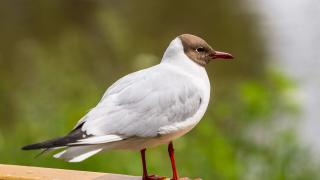Update 13.11.2023 Additional provisions on poultry keeping removed - No bird flu detected in Vantaa
The Food and Veterinary Office has lifted the additional requirements for keeping poultry due to bird flu as of 8 November 2023. There have been no cases of avian influenza or mass mortality of birds in Vantaa.

No cases of avian influenza have been detected in Vantaa.
From 8 November 2023, the Finnish Food Authority has abolished the infected zone established in the summer to prevent the spread of bird flu, including its extension.
At the same time, the disease protection provisions applicable in the infected zone will be lifted. The decision to lift the ban is justified by the fact that the disease situation in wild birds has subsided and the autumn migration of birds has already taken place.
For more details, see the Food and Veterinary Office's press release of 8.11.2023 The avian influenza infected zone will be closed (in Finnish).
Avian influenza risk also considered in Vantaa
Due to the risk of avian influenza, poultry and pet birds had to be kept indoors from 25 July to 8 November 2023. The whole of Uusimaa was in the so-called infected zone, which was subject to a strict curfew. The purpose of the outdoor ban was to prevent the transmission of bird flu from wild birds to poultry or pet birds.
According to the National Institute for Health and Welfare, swimming in natural waters has always been safe in Vantaa and there has been no reason to issue any other recommendations or regulations.
Dead wild birds
There is no reason to report individual dead wild birds. Dead birds can be picked up using disposable gloves and a mask and bagged for mixed waste if necessary, or buried at least 40 cm deep.
Instead, mass mortalities of birds should be reported to the cityʼs control veterinarian during office hours (040 536 0337) or to the City of Vantaaʼs small animal emergency service (043 824 7475). The veterinarian will record the incident.
A report must be made if found dead in the same area
- at least six waterfowl, or
- at least ten other birds, or
- one bird of prey, or
- at least two swans.
Hand hygiene must be observed when handling birds. Avian influenza viruses are poorly transmitted to humans and pets and infection usually requires close contact with infected birds or their excreta.
Further information: City of Vantaa, supervisory veterinarian Maija Neuvonen, (040 185 2674).
More information on avian influenza
The Finnish Food Authorityʼs website provides good guidance on the avian influenza situation:
See more information on avian influenza on the Finnish Food Authority´s site
Frequently asked questions about avian influenza (in Finnish)
Press release 25.7.2023 Food Authority extends avian influenza infectious zone
Press release Avian influenza risk for poultry currently significant (ETT)
Content update 13.11.2023: Text updated according to the decision of the Finnish Food Authority. The infected zone has been abolished.
Content update 10.8.2023: The date has been changed to the current date. Added text at the beginning: Situation unchanged.
Page updated 31.7.2023: Added mention of swimming. Added a new text on regarding poultry under a subheading.
Content update 26.7.2023: Changed from recommendation to regulation on keeping birds indoors. Added Food and Veterinary Office bulletin of 25.7.2023. Moved the paragraphs on poultry higher up in the text.



